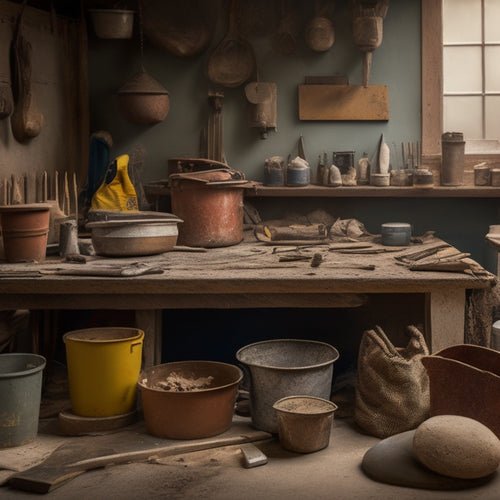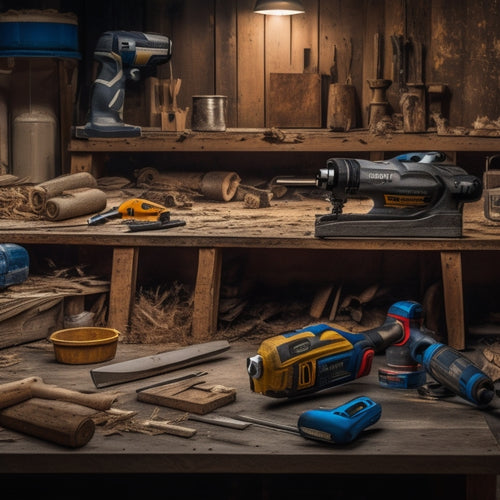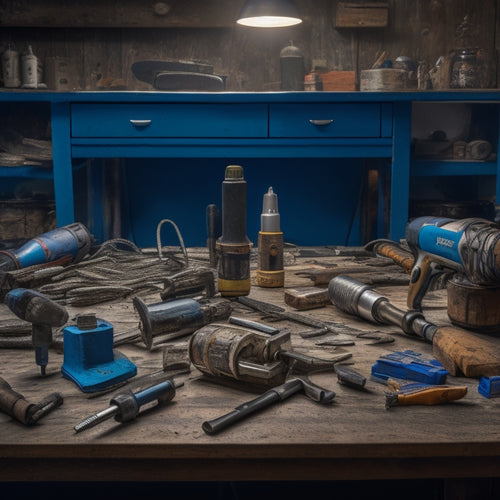
Top Pointing Trowels for Renovation Projects
Share
When tackling a renovation project, you'll need a pointing trowel that can handle the demands of dense concrete or precise mortar application on brick walls. For concrete, look for a sturdy, durable design with a sharp, angular blade made from high-carbon steel or stainless steel. For brick walls, a curved or rounded blade with a shorter length (4-6 inches) is ideal. Consider ergonomic handle design and flexible materials for reduced fatigue. With the right tools, you'll be able to achieve professional results - and discovering the best pointing trowels for your project is just the starting point for revealing a successful renovation.
Key Takeaways
• For dense concrete, choose a pointing trowel with a sturdy, durable design and a sharp, angular blade made from high-carbon steel or stainless steel.
• Curved or rounded blade trowels are ideal for brick walls, allowing for precise mortar application and better control in tight spaces.
• Invest in a variety of specialized tools, including a mixing bucket, mortar hawk, jointer, and pointing bar, to enhance efficiency and effectiveness.
• A curved or angled blade design and durable, rust-resistant coating are essential features for a trowel used for smoothening mortar joints.
• Expert-recommended brands, such as Marshalltown, Bon Tool, and Kraft Tool, offer high-quality pointing trowels with precision-ground edges and ergonomic handles.
Best Pointing Trowels for Concrete
When working with concrete, you'll need a pointing trowel that can withstand the dense, unforgiving nature of this material. This is why a trowel with a sturdy, durable design and a sharp, angular blade is vital. You don't want your trowel to bend or break mid-project, leaving you with a mess on your hands (literally!).
Look for pointing trowels made from high-carbon steel or stainless steel, as these materials can handle the rough and tumble world of concrete.
Trowel size considerations are also significant when working with concrete. A larger trowel (around 12 inches) is ideal for covering large areas quickly, while a smaller trowel (around 6 inches) is better suited for detail work and getting into tight spaces.
Don't be tempted to skimp on quality, either - a cheap trowel may seem like a good deal upfront, but it'll cost you in the long run when you have to replace it mid-project.
Top Rated Trowels for Brick Walls
You'll need a pointing trowel with a more delicate touch and a curved or rounded blade to effectively work with brick walls, as they require a more subtle and precise application of mortar. This is because brick walls have smaller joints and more intricate details, making it essential to choose a trowel that can navigate these tight spaces with ease.
Look for brick trowel features such as a shorter blade length (around 4-6 inches) and a more flexible material, like stainless steel or high-carbon steel, which will allow for better control and precision. Additionally, consider a trowel with a comfortable, ergonomic handle that fits well in your hand, reducing fatigue and strain during extended use.
To guarantee your trowel remains in top condition, remember to clean it regularly and store it in a dry place. Follow trowel maintenance tips like lubricating the blade and handle joints to prevent rust and corrosion.
With the right trowel and proper care, you'll be well on your way to achieving professional-looking results on your brick wall renovation project.
Essential Tools for Pointing Work
Frequently, pointing projects require a range of specialized tools beyond the pointing trowel to guarantee efficient and effective work.
You'll need a set of tools that'll help you master various pointing techniques, from mixing and applying mortar to finishing and cleaning joints.
A mixing bucket and a mortar hawk are must-haves for preparing and transporting mortar to the work area.
A jointer or joint raker is essential for clearing debris and creating a clean joint profile.
Don't forget a pointing bar or finishing trowel for smoothing and finishing mortar joints.
Trowels for Smoothening Mortar Joints
Select a pointing trowel specifically designed for smoothening mortar joints, as its curved or angled blade allows for precise control and even distribution of mortar in tight spaces. This specialized tool will become your new best friend when it comes to mastering mortar joint techniques.
With a trowel made for smoothening, you'll be able to achieve a seamless finish, even in the most hard-to-reach areas. When working with mortar joints, it's crucial to maintain your trowel properly to guarantee ideal results. Regularly clean your trowel to prevent mortar buildup, and store it in a dry place to prevent rust.
Additionally, consider using a trowel with a durable, rust-resistant coating to extend its lifespan. By following these tips and using the right tool for the job, you'll be well on your way to creating professional-looking mortar joints that will leave your clients impressed.
With the right trowel and a bit of practice, you'll be a pro at smoothening mortar joints in no time!
Expert-Recommended Pointing Trowels
When it comes to tackling complex renovation projects, experts swear by pointing trowels from top-tier brands, such as Marshalltown and Bon Tool, which offer exceptional quality, durability, and performance. These brands have earned their reputation by consistently delivering high-quality tools that help you achieve professional-grade results.
As an expert in renovation projects, you know that the right pointing trowel can make all the difference in your pointing techniques. With the right tool, you can achieve smooth, even joints that last for years to come.
Here's a quick rundown of the expert-recommended pointing trowels:
| Brand | Key Features |
|---|---|
| Marshalltown | Durable stainless steel blade, ergonomic handle, and precision-ground edges for smooth joints |
| Bon Tool | High-carbon steel blade, comfortable grip, and well-balanced design for reduced fatigue |
| Kraft Tool | Heavy-duty steel blade, cushioned handle, and rust-resistant coating for long tool life |
Frequently Asked Questions
How Often Should I Clean and Maintain My Pointing Trowel?
You're wise to wonder how often to clean and maintain your trusty pointing trowel! The answer lies in developing good cleaning techniques and maintenance tips.
After each use, give your trowel a quick wipe with a damp cloth to remove excess mortar.
For deeper cleaning, soak it in warm soapy water and scrub off stubborn grime.
Regularly oil the metal to prevent rust, and voilà! Your trowel will stay in top shape, ready to tackle your next renovation project.
Can I Use a Pointing Trowel for Other Masonry Tasks?
You're wondering if your trusty pointing trowel can moonlight as a multi-tasking masonry master. The answer is, it depends.
While you can use it for other tasks, it's crucial to master pointing techniques first. If you're comfortable with the basics, you can try using it for alternative tasks like applying adhesive or scooping mortar.
However, for tasks like finishing or edging, you're better off with specialized tools. Don't be a jack-of-all-trades, master-of-none – use the right tool for the job to avoid messy mistakes!
What Is the Ideal Handle Material for a Pointing Trowel?
As you grip the handle of your trusty pointing trowel, it's like holding a steadfast partner that's got your back - or in this case, your masonry project.
When it comes to the ideal handle material, you're spoilt for choice between wood and plastic. Wood offers a traditional feel, but plastic is more durable.
Look for ergonomic designs that fit comfortably in your hand, reducing fatigue and increasing precision.
Are Pointing Trowels Suitable for Mixing Small Amounts of Mortar?
You're wondering if pointing trowels are suitable for mixing small amounts of mortar?
Well, the answer isn't a straightforward yes or no. It depends on the mortar consistency you're aiming for and the trowel size you're working with.
If you're going for a smooth, fine mix, a smaller trowel might do the trick.
But if you need a thicker, chunkier blend, you're better off with a dedicated mixing tool.
Can I Use a Pointing Trowel With Epoxy-Based Mortars?
A million things can go wrong in a renovation project, but using a pointing trowel with epoxy-based mortars shouldn't be one of them.
You'll be thrilled to know that most pointing trowels are compatible with epoxy-based mortars, but it's essential to check the manufacturer's specs first.
When applying epoxy mortars, use a trowel with a sturdy, epoxy-resistant coating to prevent damage.
With the right combo, you'll achieve a flawless mortar application and avoid costly rework.
Conclusion
You've got the perfect pointing trowel for your renovation project, and now you're ready to tackle that concrete, brick, or mortar joint like a pro!
With the right tool in hand, the possibilities are endless - you'll be smoothing out imperfections in no time, and your finished product will be so flawless it'll shine like the top of the Chrysler Building!
Remember, a good pointing trowel is an investment in your project's success, so don't skimp on quality.
Related Posts
-

What Plastering Tools Do You Need for Renovation
You'll need a range of specialized tools to tackle a plastering renovation project efficiently and effectively. Essen...
-

10 Best Power Tools to Buy for Home Renovation
To tackle your home renovation project efficiently, you'll need the right power tools for the job. A cordless drill f...
-

What to Look for in Pneumatic Renovation Tools
When selecting pneumatic renovation tools, you'll want to take into account several key factors to guarantee optimal ...


